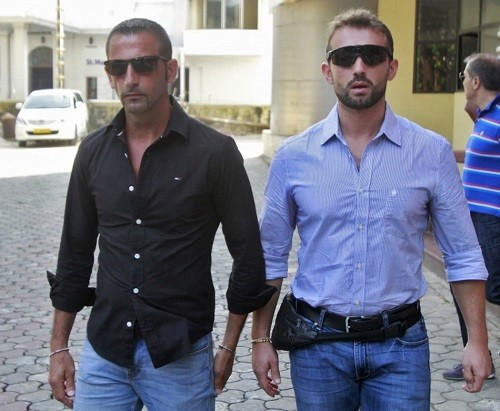Germany Supports Italy as Trial of Marines in Sea Killing Case in India Stalled

Germany has thrown its weight behind Italy after the trial of two Italian marines charged with the killing of two Indian fishermen stalled in India's Supreme Court due to a dispute between two government ministries over the laws under which the marines are to be tried.
Michael Steiner, Germany's ambassador to India, stressed the need to secure a speedy resolution of the two-year-long dispute, saying an amicable settlement was in the interest of India, Italy and the European Union.
"Italy is part of the EU so we are following the case closely. It is on one hand a bilateral issue, but we think it is in the mutual interest of India, Italy and the EU to solve it smoothly, considering it has been going on for two years (now)," Steiner said, the Hindustan Times reported.
The case, whose timeline is peppered with moments of high drama, was adjourned by the Supreme Court of India after the government prosecutors asked for more time to settle differences between the ministries.
While India's home ministry allowed the investigating agency to invoke the Suppression of Unlawful Acts against Safety of Maritime Navigation Act (SUA), the home ministry took a more lenient stance considering that a trial under charges invoking death penalty would seriosuly damage relations with Italy.
The Indian lawyers for the Italian marines, Massimiliano Latorre and Salvatore Girone, said trial under the SUA will violate the Indian government's assurance to Italy last year that the marines would not be charged with offences that carry the death penalty.
Italy is part of the EU so we are following the case closely. It is on one hand a bilateral issue, but we think it is in the mutual interest of India, Italy and the EU to solve it smoothly, considering it has been going on for two years.
Invoking terrorism charges under SUA would be "contrary to the sovereign assurance given by the government of India to the government of Italy," said marines' lawyer Mukul Rohatgi, the New York Times reported.
That assurance on death penalty was given when the marines refused to come back to India to stand trial after they were allowed to visit Italy during Christmas 2013. The marines, at the centre of a heated bilateral tussle for over a year, had been controversially allowed to visit the homeland after the Italian envoy gave an undertaking that they would return to India.
Dramatic twist
However, in a dramatic twist of events, the Italians said the marines would not return. New Delhi reacted angrily, issuing an airport alert for the Italian ambassador and ordering his arrest if he tried to leave the country.
The marines returned after India offered to waive trial under charges invoking death penalty and have lived in the Italian embassy in New Delhi for the past one year.
India's top court had asked the government to establish a special court to speed up the judicial process, but the latest development hinted at further delays.
The diplomatic row between India and Italy began with the killing of two fishermen off the coast of southern Kerala state on 15 February, 2012.
Hours after the fatal shooting was reported, Indian coast guard seized Italian merchant ship Enrica Lexie. After days of negotiations and spat over the legal jurisdiction, the Italians handed over the marines who had shot at the Indian fishing boat.
The Italians said they had mistaken the fishermen for pirates and fired the shots in self-defence. They also said the incident took place in international waters.
However, the Indians countered that the incident took place too close to the shore and not in the high seas infested with pirates. The surviving crew of the fishing boat said there was no altercation with the merchant ship prior to the shooting.
The marines were arrested and charged with the killing even as Italy refused to give up on the jurisdictional dispute and continued to exert diplomatic pressure on India.
AgustaWestland case
However, the alleged U-turn by the Indian government over death penalty has infuriated the Italian media, which termed it as India's revenge move.
The Italian media said the Indian move was in retaliation for the revelation in Italy that top politicians in India's ruling party might have been involved in a tainted deal to buy AgustaWestland choppers from the Italian firm Finmeccanica.
"There is a weaving of dates of suspicion and fear that the fate of two marines may be linked to the outcomes of the process on the 30 million Euro bribe paid by Finmeccanica to politicians in India," Italian newspaper Tempo reported.
In India, any perceived lenience to the Italians will cost the government dear as it is headed by Sonia Gandhi, an Italian married to late prime minister Rajiv Gandhi.
However, India's federal government was likely to withdraw the terrorism charges against the marines and thereby speed up the trial process, the Hindustan Times reported, citing unnamed sources in the government.
© Copyright IBTimes 2025. All rights reserved.




















